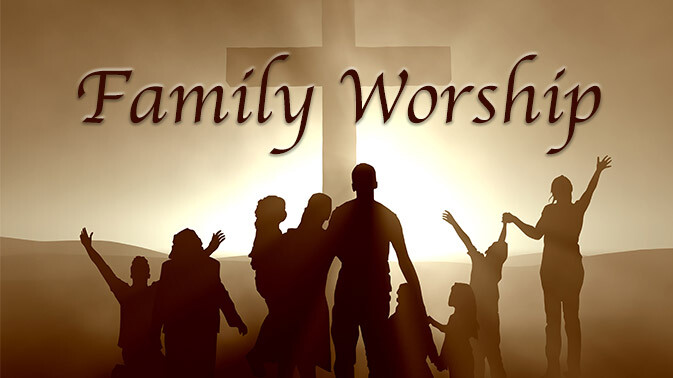
“As for me and my house, we will serve the Lord.”—Joshua 24:15.
“Let me die the death of the righteous, and let my last end be like his!” We have said, my brethren, on a former occasion, that if we would die his death, we must live his life. It is true that there are cases in which the Lord shows his mercy and his glory to men who are already lying on the death-bed, and says to them, as to the thief on the cross, “Today shalt thou be with me in paradise.” The Lord still gives the Church similar examples from time to time, for the purpose of displaying his sovereign power, by which, when he is pleased to do so, he can break the hardest hearts and convert the souls most estranged, to show that all depends on his
History
Family worship is the most ancient as well as the holiest of institutions. It is not an innovation against which people are readily prejudiced; it began with the world itself.
from the beginning
It is evident that the first worship which the first man and his children paid to God could be nothing else than Family
the Patriarchs
Thus
this day,” said the Lord by Moses, “shall be in thine heart: and thou shalt teach them diligently unto thy children, and shalt talk of them when thou sittest in thine house, and when thou walkest by the way, and when thou liest down, and when thou risest up.” Joshua, in our text, declares to the people that they may worship idols if they choose, but that he will not join in their profane festivities; and that alone in his dwelling he and his house will serve the Lord. Job “rose up early in the morning, and offered burnt-offerings according to the number of his children; for he said, It may be that my sons have sinned!” David, whose whole life was one continual adoration of God, and to whom one day spent in the courts of the Lord was better than a thousand in the tents of wickedness, did not neglect the family altar; for he exclaimed, “That which our fathers have told us we will not hide from their children.”
the New Testament era
If we pass on to the times in which our Savior appeared, we find domestic instruction practiced in the pious families of Israel. Thus St. Paul could say to Timothy, “From a child thou hast known the Holy Scriptures, which are able to make thee wise unto salvation. I call to remembrance the unfeigned faith that is in thee, which dwelt first in thy grandmother Lois, and thy mother Eunice; and I am persuaded that in thee also.” Jesus, during his ministry, laid the foundations of Family Worship among Christians, when he said, “Where two or three are gathered together in my name, there am I in the midst of them.” St. Paul recommended it, saying, “Rule well your own houses; speaking to yourselves in psalms and hymns and spiritual songs, singing and making melody in your heart to the Lord; giving thanks always for all things unto God and the Father in the name of our Lord Jesus Christ.” Yes, my brethren, if we enter the humble dwellings of those primitive Christians, after having visited the tents of the patriarchs, we shall still find the same Family Worship offered up unto the Lord; we shall hear afar off those hymns, which may perhaps betray the presence of the disciples of the Crucified to their persecutors, and cause their destruction, but which joyfully arise to the throne of their Saviour, because it is better to fear him than to fear men; we shall see them assembled around the Sacred Book, which they afterward conceal with care, to preserve it from the hands of those who would fain destroy it.
the early Church
Clement of Alexandria, an illustrious doctor of the Church, near the beginning of the third century, advised Christian husbands and wives to make it a daily practice to pray and read the Bible together in the morning, and he added, “The mother is the glory of the children, and the wife is the glory of the husband; all are the glory of the wife, and God is the glory of them all.” Tertullian, shortly before
the reformation
If we leave the humble dwellings of the primitive Christians, it is true that we shall find the practice of Family Worship becomes less and less frequent; but how gloriously it reappears at the epoch of the Reformation! How great an influence it exerted then upon the creed, the manners,
and the intellectual development of all the nations which returned to primitive Christianity! It is not very long since it was still to be found in all evangelical families. If our fathers were deprived of its light, our forefathers were acquainted with it. It flourished especially in the evangelical provinces of this kingdom
My brethren, such has been, in all times, the life of piety. And will we be Christians, or will we not? Shall we invent a new mode of piety which will harmonize with the world, or shall we hold fast to that which God has commanded us to possess? Shall we not say, in looking at that worship which passed from the tents of the patriarchs to the houses of the primitive Christians, and was finally established in the dwellings of our fathers, “As for me and my house, we will serve the Lord”?
Original document from Chapel Library.
https://www.chapellibrary.org/files/7213/7643/3202/fwor.pdf
